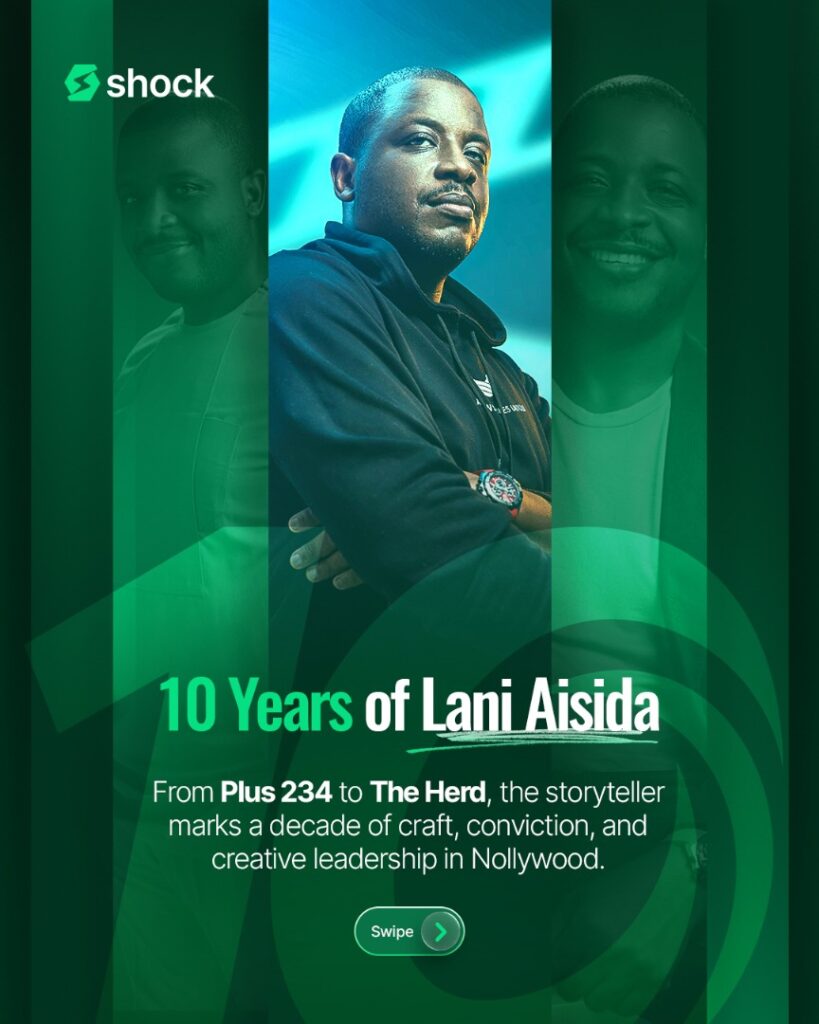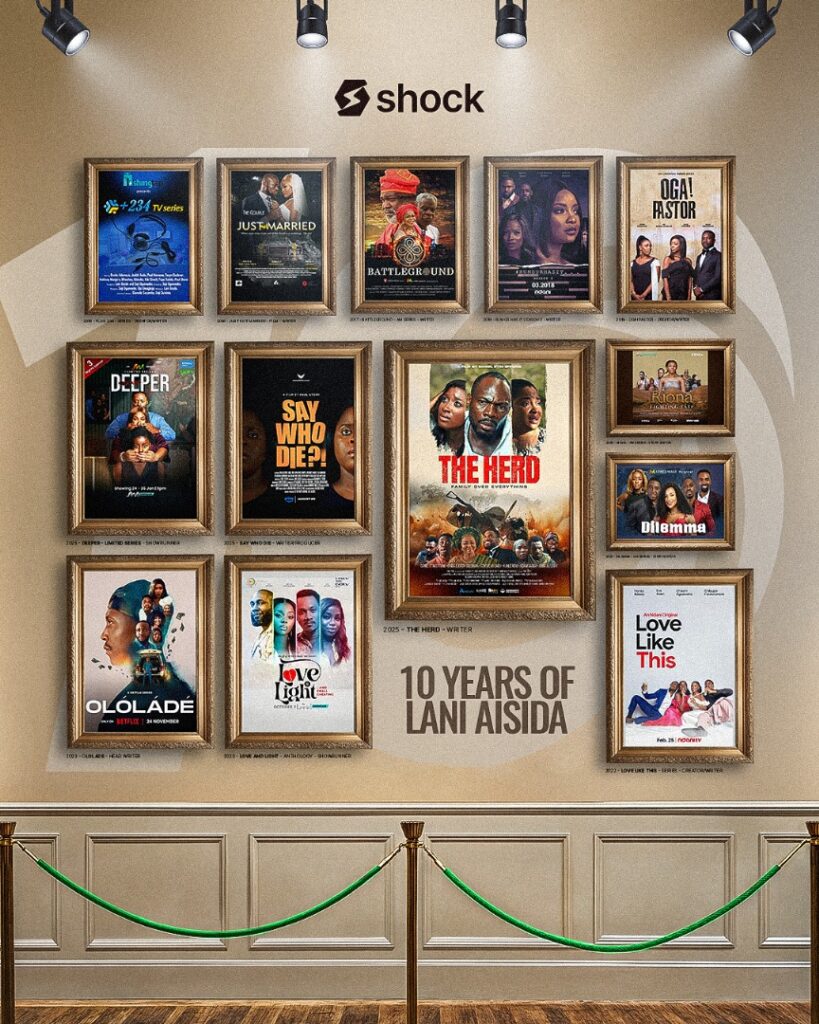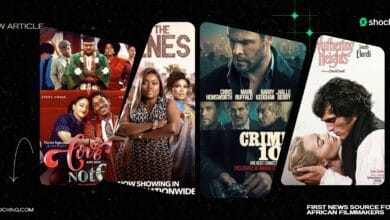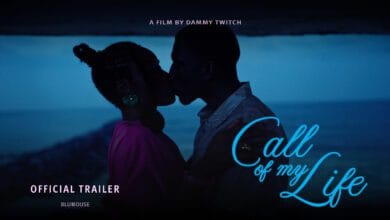The Story⚡
From Plus 234 to The Herd, the Nigerian screenwriter reflects on ten years of storytelling, creative evolution, and why truth and discipline remain his greatest tools.

Tell Me More
For ten years, Lani Aisida has quietly shaped the landscape of contemporary Nigerian storytelling. Emerging in 2015 with the web series Plus 234, Aisida has written, created, or showrun some of Nollywood’s most defining projects, including Just Not Married, Rumor Has It, Riona, Dilemma, Love Like This, Ololade, and The Herd. From the web era to television and now feature films, his journey reflects both the evolution of Nollywood and the resilience of the writer’s craft. In this conversation, Aisida looks back on a decade of storytelling—his pivotal moments, creative philosophy, and what it truly means to build a career rooted in truth, persistence, and community.
Enjoy the interview!
This year marks ten years since Plus 234 (2015) introduced you as a creator and writer. Looking back, what does this ten-year milestone mean to you personally and professionally?
I feel like I’ve had my head down for so long working, and just like that, it’s been ten years. Like a whole decade. First off, I’m grateful. Personally, it’s a reminder of how far discipline and persistence can take you. There’s a song title from one of my favorite artistes that I’ve lived by. Never Let Them See You Sweat. It’s been a long and rewarding journey professionally. A decade of people investing in ideas that didn’t exist before I put them on paper is both humbling and deeply validating.
If you were to pick five pivotal moments from your career so far (moments that defined your growth or shifted your direction), what would they be, and why?
This is tough because every project has pushed me North in one way or the other. But I’ve spent my decade-long career putting my characters in difficult situations. So, I guess it’s my turn.
Plus 234 (2015): This series launched my Nollywood career, so it will always be dear to me.
Just Not Married (2016): I wrote this movie in my bedroom, and it somehow got showcased at TIFF. Perhaps I have the skill to go global with this thing. It was validation.
Battleground (2017): This was my first writing room experience. I usually say it was like film school for me because I learned so much about structure, collaboration, scale, and more.
Oga! Pastor (2019): I created a show for a huge channel, and even though the run ended unexpectedly, it reinforced my conviction that art can impact real life. A cornerstone of my creative belief is that art can’t be art for art’s sake but should move, question and influence society.
Love and Light (2023): The first scripted, commissioned production of my company, African Stories Untold. It marked my transition from writer to showrunner.
Many writers struggle with consistency in Nollywood’s fast-changing industry. What has helped you stay grounded and relevant over the past decade?
The constant desire to improve has kept me grounded. I started in the industry as a screenwriter and producer, but I soon realised there was so much to learn about
screenwriting if I truly wanted to reach the heights I dream of. So, I dropped the producer hat and dug deep into the unglamorous but deeply fulfilling world of screenwriting. That decision changed everything. Over the years, I’ve learned to evolve with the format — series and feature — and to understand the inner working of different media, from web to TV to the big screen. Another key element has been community. I’ve been fortunate and deliberate in immersing myself in a community of people who strive to be the best storytellers, from writers to directors to editors. Having said that, I’m still building. Always building.
From Plus 234 to The Herd, you’ve worn many hats — creator, writer, head writer, story editor, and showrunner. How have these roles shaped the kind of storyteller you’ve become?
There are a lot of stories to tell between those two projects, from produced scripts to unproduced ones to those stuck in development hell. All the highs and lows between those two projects have taught me not to get too high with the highs and too low with the lows. I’m just an ever-improving storyteller who’s focused on growth and on finding new ways to make my work influence viewers in a positive, lasting way.
You began as one of the leading voices in the web series era. How did that early experience prepare you for the transition to television, and now, to feature-length writing?
To be honest, I didn’t even realize when I became a leading voice, I just kept working, and then a friend called me the ‘King of Web Series’ and I liked the ring to it. With web series, the platform was YouTube, and the feedback was instant in the comments section. That experience taught me a lot about how audiences react to storylines, how to capture attention quickly and how to sustain it with emotion. Those instincts still serve me today in TV and film — understanding pacing, audience attention and character depth.
What has been the most significant shift in your writing philosophy between Just Not Married (2016) and The Herd (2025)?
When I wrote Just Not Married, I was focused on telling a good story. With The Herd, I was focused on telling a true one. I’ve learned that truth (emotional, social, human) is what lasts. The packaging matters, but honesty gives it soul.
Your stories often explore the moral complexity of “good people doing bad things for good reasons.” How has your understanding of morality and human motivation evolved across the years?
The key thing for me is that I’m never trying to preach to the audience. It’s always about creating a compelling argument where both sides have valid points, then leaving it to the viewer to decide where they stand. People are shaped by circumstance, pain, love, and survival. We’re all nuanced beings who sometimes contradict our strongest beliefs when faced with uncomfortable situations. I love to place my characters right in that tension so viewers can see parts of themselves in the character, and hopefully empathize.
Having worked on projects like Rumor Has It, Riona, Dilemma, and Ololade, what do you now consider the most challenging and rewarding part of screenwriting in Nigeria?
Should I sugarcoat it? Nah. Time and money. And IP conversations.
The Herd marks a new phase for you as a feature writer whose work premiered at Cannes and is now a hot title in cinemas. In what ways does this film represent your growth as a storyteller after ten years in the industry?
One of the key skills I’ve been trying to hone is one that I believe is important for any screenwriter: the ability to address societal issues without compromising on the entertainment value audiences expect. Sometimes, filmmakers expect the audience to connect with a project simply because of its subject matter, forgetting that viewers ultimately want to be entertained. I genuinely believe I was able to find that balance with The Herd.
How did your past experiences as a showrunner (Love and Light and Deeper), or story editor (Riona and Dilemma), influence your creative decisions on The Herd?
A movie is a sum of its parts, and with The Herd, all the parts worked beautifully. As a showrunner, I’ve learned that every department contributes to making a great project and building on the foundations of a strong script. With The Herd, the producer and director did an incredible job assembling a team that worked wonders with the script. Film is, at its core, a collaborative art form, and this project reminded me just how powerful that collaboration can be.
What personal or thematic threads from your earlier works found their way, consciously or not, into The Herd?
Hmmmm. That’s a tough one because every project has a life of its own. But if there’s a thread that runs through most of my work, it’s family and love. I like to unpack what those two things mean to different people because they shape so much of who we are and how we live.
Looking at the Nigerian screenwriting landscape today, what changes have you observed since you started, and where do you think writers now have the most power or opportunity?
Writers are more visible and are looking to be more than writers. I don’t know where writers have the most power, but I would appreciate it if more producers understood the importance of investing heavily in the script, which is the foundation of what you are looking to spend millions on. A good script will solve half your problems. Spend that money on the script.
As someone who has mentored or inspired younger writers, what lessons or mistakes from your ten-year journey would you want the next generation to learn from?
Writers are in a unique position in the production chain. Unlike actors, editors, or directors, we don’t need someone to commission us before we create. We can literally have an idea and turn it into a script all on our own. So, my advice to young writers is: don’t wait to be commissioned. Just write. Keep busy, experiment and get all the bad writing out of your system. Spend the bulk of your time studying and honing your craft, not chasing viral moments and fame. Embrace your mistakes, invest deeply in your work and never stop being curious about the storytelling process.
When the story of Lani Aisida’s first ten years is told in a picture, what do you hope it says about your contribution to Nollywood’s storytelling evolution? Also, name the movie.
Interesting question. I hope it says that I championed entertaining stories that were bold, honest and reflective of real human experiences. I hope it says that I played a part in broadening the perspectives of younger storytellers. I hope it reflects my commitment to continuous self-development and my deep respect for the audience’s time engaging with my content. The movie will be called “Up & Up” because it will capture both the journey and the mindset behind my work.
What are you working on next as you begin another decade of storytelling?
We have a slate that I’m excited about. Feature films and original series. The first off that list is a comedy series that we are currently developing. We are exploring co-productions that can take our stories to broader audiences. In addition, I’m looking to create a structured way in which we can help writers become better versions of themselves. Also, we’ve started a micro-festival called Unreleased, and I’m excited for the evolution of that in ten years. The goal is to live up to my company’s name — African Stories Untold — by telling more and diverse African Stories.
In another life, what would you have been doing if you weren’t telling stories?
I’m a chartered accountant. So, perhaps I’ll be doing that.
In Summary
The Herd, written by Lani Aisida and directed by Daniel Etim Effiong, premiered in cinemas nationwide on October 17, 2025. Catch it on the big screen and join the conversation.

Thanks for Reading.
Shockng.com covers the big creators and players in the African film/TV industry and how they do business.
Let’s be friends on Instagram @Shockafrica



